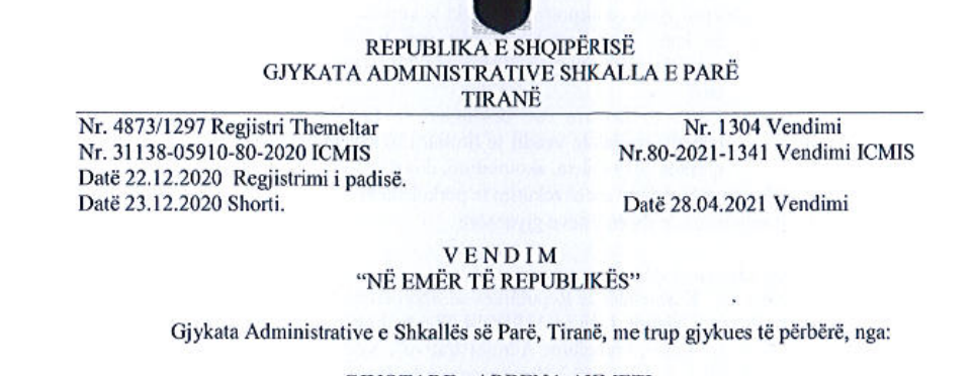VIOLA KETA
The Administrative Court ruled in favor of Faktoje, giving it the right to receive documentation from the Prime Minister’s Office on the travel expenses of the head of the institution overseas. Meanwhile, the President’s Office and the Ministry of Foreign Affairs, which refuse to provide invoices for travel expenses abroad, have been fined and if the violation continues the case will be tried by the European Court of Human Rights.
Faktoje has scored yet another legal battle victory with state institutions. The Administrative Court of First Instance decided in favor of the request that the Prime Minister’s Office submit the invoices for travel expenses abroad, for the period January 2018 – June 2019. The decision was made on 28.04.2021.

Unlike the immediate execution decisions issued by the Administrative Court for some of the ministries, in the case of the Prime Minister’s Office, the process will have to be completed at all levels of appeal for the execution of the final decision. However, the legal representative of Faktoje in this battle, lawyer Irena Dule considers this decision a victory:
“It is not the first time that the court decides in favor of public information, against the right to protection of personal data, which this time was used as an excuse not to make public information on state financial expenditures. Again, this is to be commended, as the Court remains the only solution for journalists and the public who want to be informed about sensitive information. “But at a time when this solution had to be provided more quickly and without cost by the Commissioner’s office, unfortunately it regularly advocates for institutions that do not want to make public activity transparent.”
The Prime Minister’s Office is one of the institutions that were sued by Faktoje in the Administrative Court, because they provided an incomplete response in September 2019 (about three months after the request for information) on the Prime Minister’s travels. The first lawsuit against this institution, filed in September 2020, was dismissed by the court, arguing that the deadline had been exceeded, but a new lawsuit with the same object was filed by Res’ Publica center.
Of the 11 respondent institutions, the Administrative Court has ordered immediate execution (submission of documentation after the completion of the process in the first instance, without waiting for the decisions of the appellate instances) for the following institutions:
Ministry of External Affairs
* The Assembly of Albania
President’s Office
President’s Office and the Ministry of External Affairs ‘sent’ to court for fine after preventing the bailiff’s office to execute court order on invoices
President’s Office of the Republic of Albania continues to refuse to issue invoices of overseas travel expenses of Mr. Ilir Meta. The Secretary General of this institution is expected to be fined for this violation and according to the official announcements the bailiff’s office is following the procedures to execute the court’s decision to fine the institution.
The President’s Office marked a unique case not only by violating the decisions of justice institutions, but it also put pressure on them through official documents.
The Ministry of Europe and Foreign Affairs is also among the institutions for which the court has been asked to impose a fine, after they refused to execute the court decision voluntarily. The bailiff’s office requested the MoEFA be fined for this violation. The court decided not to accept the request, because according to the court, the Bailiff’s Office itself has the authority to impose a fine.
According to lawyer Dule, the Bailiff’s Office is following procedures for administrative measures.
What happens if after the fine the institutions don’t provide the required documentation?
“If, even after the penalties, the respective bodies do not implement the decision, as it may have occurred in other cases, we can request the execution of the decision by the European Court of Human Rights. This certainly will take a lot of time and makes the decision of the Court ineffective.” – stated for Faktoje lawyer Dule, who argues:
“If anything like that happens and the executive violates the law and does not abide to court decisions, which is beyond any principle of the rule of law, then it should be considered a scandal for a country where the principle of division of powers is applied.”
How is the process going for the other 5 ministries?
For some ministries the judicial proceedings continue at the second instance, at the Courts of Appeal.
The Ministry of Defense has appealed the first instance decision, which ruled in favor of Faktoje for the provision of the required documentation.
In the meantime, Faktoje’s lawsuit against the Ministry of Finance and Economy and the Ministry of State for the Diaspora, has been fully accepted, but without the obligation for immediate execution, which means that the process will have to wait for the end of trials (which may take up to several years), if the decision in favor of Faktoje is upheld.
Faktoje has appealed this decision as well, requesting its immediate execution.
Lawsuits against the Ministry of Health and the Ministry of Infrastructure and Energy, have been partially accepted, arguing that invoices cannot be provided as this would constitute a violation of personal data, a double standard compared to the decisions of the other 8 institutions, for which the same court ruled in favor of the provision of the invoices.
For institutions that are in the process of appeal, lawyer Irena Dule says that there is still no set date for the hearings and they are not expected for at least 3-4 years.
*Note: The Ministry of Culture and the Assembly of Albania have provided the invoices for Faktoje after a new and more detailed request for information to all executive institutions, this time for the period January 2018-February 2021.
*First picture was taken by the ATSH.





